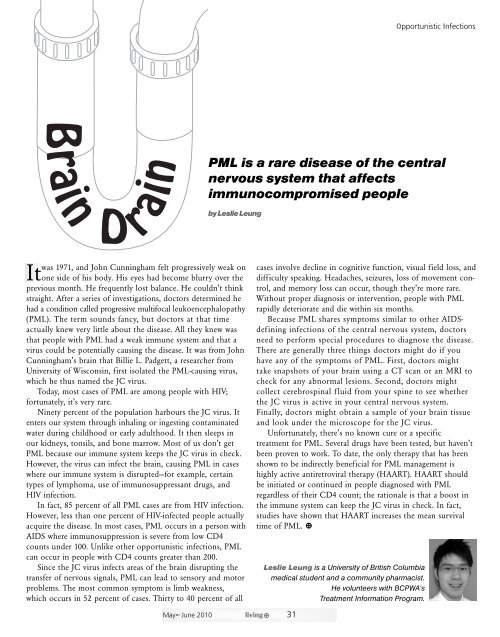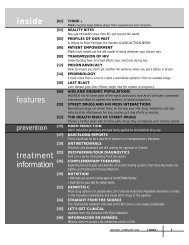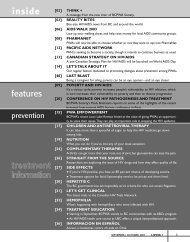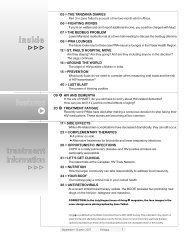liv poz mag.qxd - Positive Living BC
liv poz mag.qxd - Positive Living BC
liv poz mag.qxd - Positive Living BC
You also want an ePaper? Increase the reach of your titles
YUMPU automatically turns print PDFs into web optimized ePapers that Google loves.
Opportunistic Infections<br />
PML is a rare disease of the central<br />
nervous system that affects<br />
immunocompromised people<br />
by Leslie Leung<br />
was 1971, and John Cunningham felt progressively weak on<br />
Itone side of his body. His eyes had become blurry over the<br />
previous month. He frequently lost balance. He couldn’t think<br />
straight. After a series of investigations, doctors determined he<br />
had a condition called progressive multifocal leukoencephalopathy<br />
(PML). The term sounds fancy, but doctors at that time<br />
actually knew very little about the disease. All they knew was<br />
that people with PML had a weak immune system and that a<br />
virus could be potentially causing the disease. It was from John<br />
Cunningham’s brain that Billie L. Padgett, a researcher from<br />
University of Wisconsin, first isolated the PML-causing virus,<br />
which he thus named the JC virus.<br />
Today, most cases of PML are among people with HIV;<br />
fortunately, it’s very rare.<br />
Ninety percent of the population harbours the JC virus. It<br />
enters our system through inhaling or ingesting contaminated<br />
water during childhood or early adulthood. It then sleeps in<br />
our kidneys, tonsils, and bone marrow. Most of us don’t get<br />
PML because our immune system keeps the JC virus in check.<br />
However, the virus can infect the brain, causing PML in cases<br />
where our immune system is disrupted—for example, certain<br />
types of lymphoma, use of immunosuppressant drugs, and<br />
HIV infection.<br />
In fact, 85 percent of all PML cases are from HIV infection.<br />
However, less than one percent of HIV-infected people actually<br />
acquire the disease. In most cases, PML occurs in a person with<br />
AIDS where immunosuppression is severe from low CD4<br />
counts under 100. Unlike other opportunistic infections, PML<br />
can occur in people with CD4 counts greater than 200.<br />
Since the JC virus infects areas of the brain disrupting the<br />
transfer of nervous signals, PML can lead to sensory and motor<br />
problems. The most common symptom is limb weakness,<br />
which occurs in 52 percent of cases. Thirty to 40 percent of all<br />
cases involve decline in cognitive function, visual field loss, and<br />
difficulty speaking. Headaches, seizures, loss of movement control,<br />
and memory loss can occur, though they’re more rare.<br />
Without proper diagnosis or intervention, people with PML<br />
rapidly deteriorate and die within six months.<br />
Because PML shares symptoms similar to other AIDSdefining<br />
infections of the central nervous system, doctors<br />
need to perform special procedures to diagnose the disease.<br />
There are generally three things doctors might do if you<br />
have any of the symptoms of PML. First, doctors might<br />
take snapshots of your brain using a CT scan or an MRI to<br />
check for any abnormal lesions. Second, doctors might<br />
collect cerebrospinal fluid from your spine to see whether<br />
the JC virus is active in your central nervous system.<br />
Finally, doctors might obtain a sample of your brain tissue<br />
and look under the microscope for the JC virus.<br />
Unfortunately, there’s no known cure or a specific<br />
treatment for PML. Several drugs have been tested, but haven’t<br />
been proven to work. To date, the only therapy that has been<br />
shown to be indirectly beneficial for PML management is<br />
highly active antiretroviral therapy (HAART). HAART should<br />
be initiated or continued in people diagnosed with PML<br />
regardless of their CD4 count; the rationale is that a boost in<br />
the immune system can keep the JC virus in check. In fact,<br />
studies have shown that HAART increases the mean survival<br />
time of PML. 5<br />
Leslie Leung is a University of British Columbia<br />
medical student and a community pharmacist.<br />
He volunteers with <strong>BC</strong>PWA’s<br />
Treatment Information Program.<br />
MayqJune 2010 <strong>liv</strong>ing5 31











